[MOVIE ESSAY] The Mirror (1975) by Andrei Tarkovsky
When people ask me what my favorite movie is, "The Mirror" by Andrei Tarkovsky (1932-1986) is always one of the first that come to mind. I cried the first time I saw it. The emotional dam burst so to speak. I didn't really understand why or fathomed what the movie was about, but the feelings were not lying, and the best word to describe the experience is probably catharsis. I was delivered. Tarkovsky not only changed my approach to film, but also the way I related to the world, and myself. For me it was his 1979 film "Stalker". After that the whole existence in a sense became "Tarkovskified".
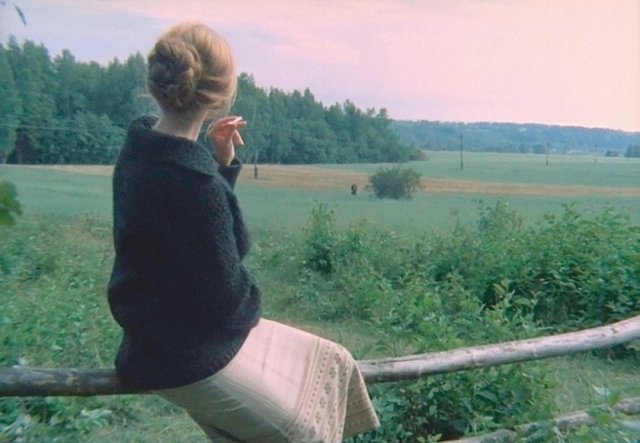
"The Mirror" is an autobiographical film, but the protagonist and narrator is seen just a few moments in the movie. The same goes for the father of the narrator, who is mentioned and quoted throughout the film, but only appears in one short sequence. We hear his voice, and we see the children come running. The next moment the father is pressing the children's faces against the coarse fabric of his uniform. The face of the mother goes through a bizarre transformation. From one moment to the other, we see the expression change from happiness of seeing the family reunited, to pain, and then to spiteful contempt. It's one of the most loaded and contradictory scenes in the whole movie. But from whose perspective is it portrayed? From the mother? From the child? From the narrator? Or from the returning father?
The plot of "The Mirror" unfolds in three different time dimensions simultaneously. In the now the narrator lives in a divorce conflict, which ultimately is about who will have custody of the couple's twelve-year-old son. In a layer underneath we have the protagonist's memories of the years during the war, when he and his sister alone grew up with his mother in a country house. In another layer, below these, there are vague memories of the time immediately after the divorce of the protagonist's parents.
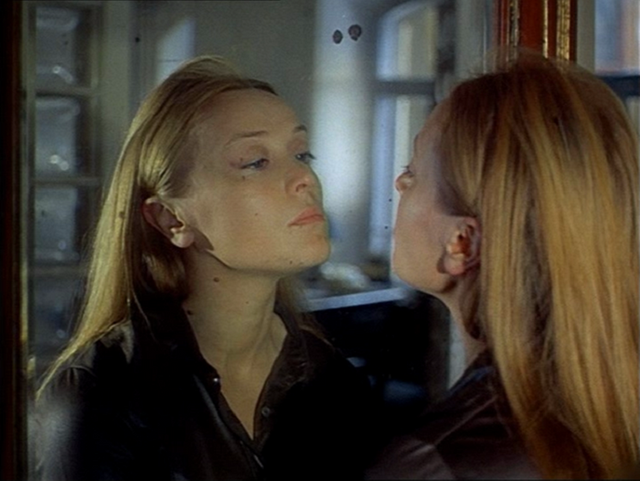
We are all incredibly abstract individuals looking at the inner life that flows freely in the form of memories, imaginations, associations and desires. In just over 100 years, authors have attempted to described these inner monologues. Filmmakers have also made attempts, but Tarkovsky was the first to completely base a film on such a flow of thoughts. The thoughts are those of a dying man, which constantly takes us to his childhood. Tarkovsky worked on this film for a very long time, and with a constantly shifting team of collaborator. It was edited in some 20 different versions before Tarkovsky was satisfied. It's said that the script was completed during production, which could have contributed to the organic feeling of the film.
"The Mirror" is a beautiful film. It's ambiguous, perhaps the most ambiguous film ever. And it's difficult to understand. I often feel an urge to revisit it as if it were a mirror, where I time after time can discover something new, something more, depending on my own approach. This is why I have some reluctance to write about "The Mirror". When I do, it becomes fragmented: mirror shards, associations, scattered reflections on what affects me just in the moment I write about it. Every time I see it I think in advance that I have seen it before, and every time I sit there with new thoughts, reflections and feelings.
After five or six views the puzzle pieces begin to fall into place. But we don't need to "understand" it. We can actually relax and just let it flow freely and allow it to serve as a link between our conscious and subconscious. Letting go of the need for control for a moment. The effect will be profoundly liberating.
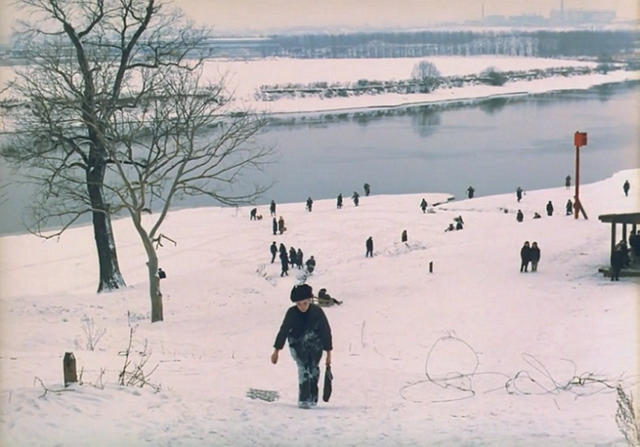
It's a film to regard in the same way one regards the starry sky or is awed by a landscape. A film that makes us connect with the universality of existence. A reflection of ourselves and our existential situation. When one simultaneously sees the other and oneself, and at the same time reflects the third - our common humanity. All alone and at the same time part of a common whole. A film that awakes my desire for something meaningful. My desire to become whole. Can art possibly be anymore relevant than this?
"Anyone who wants can look at my films as into a mirror, in which he will see himself." - Andrei Tarkovsky, "Sculpting in Time"
And this is an approach that Tarkovsky had in all of his films, the seven he created during his all too short life. But perhaps it's most evident in this one, his fourth film. It's as I said an autobiographical film, but not autobiographical in the sense that we get to know very much about Tarkovsky on a concrete level. It's rather a dreamlike elegy. He uses material from his own life, his own feelings, his past: both conscious and unconscious. Both the exterior, what was happening around him, and the interior. From this he weaves a tapestry with a picture, perhaps of Tarkovsky, one in which I as a viewer also have an opportunity to see myself in. Tarkovsky's films are not just about "someone else"; we can with easy reflect ourselves in them as if they were mirrors. Art as a mirror requires of us as spectators, in front of the mirror, that we are willing to participate. We're not just lazy "cultural consumers" when we see a film like "The Mirror", but rather creative beings.
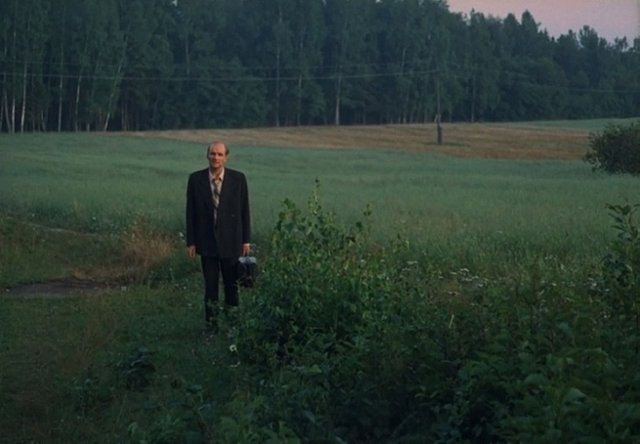
Tarkovsky reaches beneath the personal unconscious, that which is linked to me as a person and my own experiences, down into what Jung called the collective unconscious - the entire spiritual heritage of mankind's evolution reborn in the brain structure of every new individual, and the images are thus of the archetypal quality that enables them to affect us on a deeply profound level if we dare to open ourselves to them. We need to get in touch with these archetypes, or primordial patterns, in order not to lose balance and fall into neuroses of various kinds. We meet them as images in dreams, myths, fairy tales, religious beliefs, and we meet them in art. They serve as a link between our conscious self and the deep, universal and primordial collective unconscious.
In a dream scene we see the little boy whose father just abandoned the family. The boy is left alone with his mother and sister. A trauma and a painful situation in a person's life is depicted. In order to find himself and become whole, the character needs to go back to and face this painful point. All pain is moldable, takes shape, and can be transformed when we don't fear it, but sees it, sees through it. Tarkovsky reaches down to the archetypal precipitous depths like no other film maker. He does it in a way through which it becomes clear that he himself, and thus all of us, ultimately are responsible for our lives, and that we are compelled to face the unconscious side of ourselves in order to become whole.
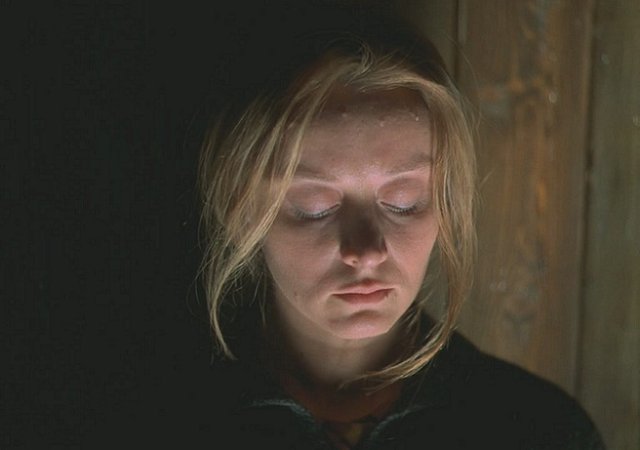
Symbols
Tarkovsky's films are filled with symbols. Flowing water and rain that falls in the interiors, buildings that are falling apart, fire, vessels that tip over, milk that is spilled, and so on. A symbol is in many ways the best possible expression for something that is still unknown. It doesn't mean that "something is equal to something else", but that something is, and also something more - it opens a connection to something else. So these symbols in his films are what they are, but they can simultaneously awaken so much more within us, unconscious layers, by association.
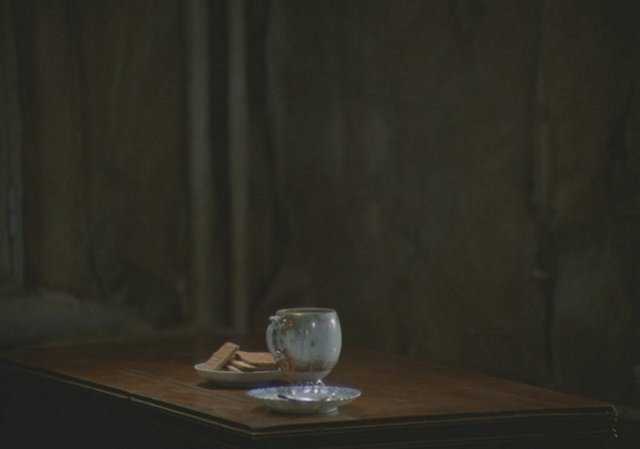
You however never feel what Tarkovsky's films are burdened by symbols, which can be said about some filmmakers (no one mentioned, no one forgotten). He's never lecturing or preaching or telling us what we should think and feel. It's probably also precisely why Tarkovsky's films are so durable. "The Mirror", "Stalker" and "Solaris" are among the films I have seen the most number of times. His films are like living entities within our psyches. They are organic and change with time, in line with the viewer. Some people I have spoken with find "The Mirror" frustrating precisely because it's so multifaceted and ambiguous. We are so accustomed to being "written on the nose" and told what to think in today's entertainment industry, and are therefore completely helpless when we get the chance to scrutinize ourselves in depth. We are sadly not trained or brought up in an environment where self-examination is allowed to grow and germinate. We need to face ourselves, but most people want something objectifiable, a product.

The movies of Tarkovsky are no drama's with a conventional story. The starting point in this elegiac, non-linear and fragmented work was not to create a "good story". He thus have much more in common with poetry than drama.
Stunning cinematography
If you have the slightest interest in cinematography you must see "The Mirror" - the cinematographic work belongs to the most beautiful in the history of film. It shifts between sepia, black and white and color. The camera's gentle movements, the pans, tilts and zooms, and non-movement for that matter, is pure perfection, and the lighting contribute to a suggestive mood. The sequence of the burning barn, filmed from inside the house with the rain falling down the gable, is a scene that I have no words for. The gust of wind blowing across the meadow just as the man is about to leave for the city, a wind that seemingly makes him hesitate - was that just a happy coincidence or was it deliberate? On a couple of occasions the characters are leaving a room or a place when the objects, as if they want to join the characters, are rolling down the table or fall from the branches.
How was it received?
The establishment in Soviet was not at all happy with "The Mirror" and considered it to be extremely provocative. The role and function of film in the Soviet Union was first and foremost to bring the citizens up into becoming good socialists, and everything in a movie should preferably be on a conscious and rational level. "The Mirror" was banned at first, but was eventually shown in smaller cinemas. In his brilliant book "Sculpting in Time" excerpt from letter's to Tarkovsky can be read. An engineer told him that "The Mirror" had given her a headache and she wondered "what should I do with a film like this?"
But there were also people who cared about and were deeply affected by his work. A woman from Gorky wrote the following: "Thank you for Mirror. My childhood was like that… Only how did you know about it? There was that wind, and the thunderstorm … “Galka, put the cat out,” my Grandmother cried… . It was dark in the room … And the paraffin lamp went out, too, and the feeling of waiting for my mother to come back filled my entire soul … And how beautifully your film shows the awakening of a child’s consciousness, of this thought! … And Lord, how true … we really don’t know our mothers’ faces. And how simple … You know, in that dark cinema, looking at a piece of canvas lit up by your talent, I felt for the first time in my life that I was not alone …"

Our lives are fleeting, but within us, our emotions are tremendous and our memories mysterious. The beautiful thing about "The Mirror" is that we can see ourselves in it. Our lives, not only Tarkovsky's. His experience is his own, but it's also universal. He has opened the door and invited us into a log cabin where we're all sitting around the table. It's a film that we can reflect ourselves in - the mirror image flickers like water, like a lake, and is just as dark, mysterious and deep; and under the water, everything is beautiful and deadly, without any oxygen. We reach for the surface again, to catch our breath. "The Mirror" is like swimming in this the lake of the psyche - up and down, back and forth - all while the forests whisper of the beauty of creation everywhere around us.
--------------------------------------------------------------------------------------------------------------------
"The Mirror" can be seen in its entirety on Mosfilm's official youtube account, with english subtitles: www.youtube.com/watch?v=9Yn9q25NWAw
Your essay was so moving I had to check out the first five minutes of the movie. Plan on saving this to watch this weekend. Thank you for sharing this!
I am thrilled to hear florentina! I hope it will be as eye- and mind-opening for you. Please let me know what you think of it!
This is going on my to-watch list.
great, let me know what you think of it once you've seen it!
You've given us a very indepth, and beautiful description of this film. I had heard of neither Tarkovsky or this particular film. But it sounds intriguing. Thank you for the link to watch the whole film. As with @geke this will go on my watch list. I enjoyed reading your article.
Thank you, glad that you got something out of it! Eager to hear your thoughts on the film!